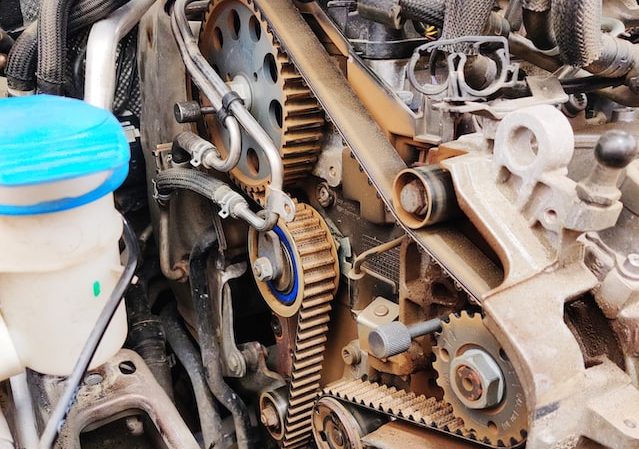
Cargroot is reader-supported. When you buy through links on our site, we may earn an affiliate commission.
Belt noise is a common issue that automotive professionals and counters when customers bring in their vehicles. This problem can be a real nuisance for both professionals and customers alike, but it’s certainly one that can be solved with patience.
Unfortunately, there are several misconceptions about the proper way to diagnose and address the belt noise issue. That’s why this article will explore the main causes of belt noise and the steps you are required to take to fix it.
Reasons Why Your Car Belt Squeals When Accelerating
If you have ever been driving your car and heard loud, annoying squealing noise coming from under the hood, it is most likely due to a warm or misaligned belt. It is responsible for the proper functioning of various accessories like air conditioning, power steering pump, and more.
Let’s discuss some of the most common reasons why your car’s belt will squeal:
Incorrect Belt Installation
One of the most common reasons why your car belt will squeal is due to incorrect installation. While installing a new belt, you should make sure that it has enough tension and is properly aligned with the pulleys. If you skip this, the belt will start squealing and eventually fail. To mitigate this issue you just have to replace the belt and install it correctly.
Leaks
Leaks from certain parts of the engine such as water oil or other fluids can contaminate the belt and cause it to make a squealing noise. In that case, you will have to find the source of the league and then proceed to repair it, while also cleaning the belt thoroughly.
Misaligned Pulleys and Tensioner
Even if the pulleys or tensioners are misaligned the belt will sleep and start making unwanted noises. To fix this issue, you will have to adjust the pulleys and the tensioner to make sure that the belt is correctly aligned.
Wear and Tear
As time goes by, the belt can wear out due to continuous use and eventually starts losing its stiffness. Over time, this wear and tear can cause the surface of the belt to become a bit glazed brittle, or cracked eventually resulting in a squealing noise. You can fix this by replacing the worn-out belt with a new one instead.
Cold Weather
Sometimes, in cold weather, the rubber on the belt of your car can become a bit stiff and start to sleep and sequel. To fix days, you can warm up the engine first before you start driving, or you can also apply a belt dressing to help them grip the pulleys.
How to Fix Car Belt Squealing Issue?
There are several ways you can fix the car belt squealing issue, such as:
Timing Belt Inspection
A loud squealing noise coming from the timing belt is an evident sign of a warm or damaged timing belt sensor stop getting it inspected by a mechanic can help you identify the source of the noise and determine if any component needs to be replaced or repaired. Keep in mind that you should address any timing belt issues promptly, as it may cause serious engine damage in the future.
Serpentine/Drive Belt Replacement
The serpentine/drive belt plays an important role in the engine as it drives multiple engine accessories, such as the alternator and power steering pump. It is a long, continuous belt that drives multiple engine accessories using a single belt.
It is usually made of rubber and has ribs on the underside that grip the pulleys on the accessories. A squealing noise coming from the engine is one of the most common signs of a worn or damaged serpentine/drive belt. Other signs may include cracks, fraying, or glazing on the belt.
It’s essential to identify these signs early on to prevent further damage to the engine accessories. To prevent future issues with your serpentine/drive belt, it’s important to perform regular inspections and maintenance.
Driver Belt Tensioner Replacement
The drive belt tensioner is a crucial component in ensuring a vehicle’s proper functioning of the serpentine/drive belt system. It is responsible for maintaining the correct tension on the belt, which keeps it running smoothly and efficiently.
However, when the tensioner is worn or damaged, it can cause the belt to slip, resulting in a squealing noise. The drive belt tensioner is important because it ensures that the serpentine/drive belt system is running smoothly.
If the belt is loose, it can slip or even come off the pulleys, causing damage to the belt and other components. On the other hand, if the belt is too tight, it can cause premature wear on the belt, tensioner, and other components.
A properly functioning drive belt tensioner helps to avoid these issues and extends the life of the serpentine/drive belt and other components. If you experience any of these issues, it is important to have your vehicle inspected by a qualified mechanic.
Final Words
So there you have it – everything you need to know about the car belt squealing issue, from reasons for this issue to occur to their solutions. We hope this information helps you get rid of the problem and get you back on the road in no time.



![[Solved] Car Shaking in Reverse – Why & How to Fix It?](https://cargroot.com/wp-content/uploads/2023/03/giorgio-trovato-gBF0CCP_Qy0-unsplash-100x70.jpg)


